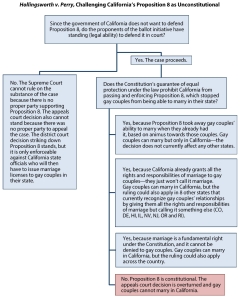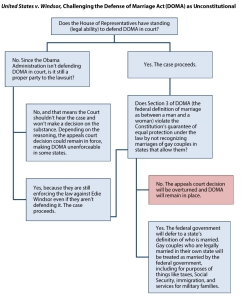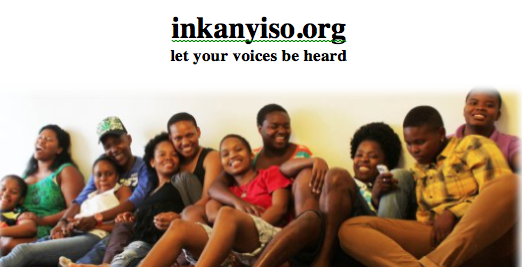Is this our chance at our Constitution’s promise of Life, Liberty and the Pursuit of Happiness?
By Cathy Kristofferson, March 22, 2013.
 Next week on Tuesday March 25th and then Wednesday the 26th the Supreme Court will hear the ‘two marriage cases’ deciding if the gay community will be allowed to enjoy the same rights, freedoms and opportunities provided by marriage as everyone else. The DOMA case, now called U.S. v. Windsor, and the Prop8 case banning marriage equality in CA, now called Holllingsworth v. Perry. both question the constitutionality of denying those same rights, freedoms and opportunities. Both cases, individually and together, provide a myriad of potential outcomes.
Next week on Tuesday March 25th and then Wednesday the 26th the Supreme Court will hear the ‘two marriage cases’ deciding if the gay community will be allowed to enjoy the same rights, freedoms and opportunities provided by marriage as everyone else. The DOMA case, now called U.S. v. Windsor, and the Prop8 case banning marriage equality in CA, now called Holllingsworth v. Perry. both question the constitutionality of denying those same rights, freedoms and opportunities. Both cases, individually and together, provide a myriad of potential outcomes.
Hollingsworth v. Perry challenges the Constitutionality of the marriage equality ban put in place in the California Constitution by the majority vote received on the 2004 Proposition 8.
U.S. v. Windsor challenges Section 3 of the Defense of Marriage Act’s ability to violate the Constitutional guarantee of Equal Protection under the Law provided by the 14th Amendment. Edie Windsor, widow of Thea Spyer, was charged estate taxes which would not have occurred if the Federal Government recognized their marriage as it does opposite gender marriages.
The folks at Third Way have created a great visual for all options for both cases.
Hollingsworth v. Perry:

U.S. v. Windsor

EDITORS NOTE:
AFTER reviewing the options above – questions are not covered and some remain unanswered – so we are not sure that this graph covers all instances. Also the graph presupposes in one instance if the ruling is that the federal government will defer to state’s definition of who is married. It says ” Gay couples who are legally married in their own state will be treated as married by the federal government”… as such. However what if a couple is married and then lives in a State that does not recognize same-sex marriage – will that couple still be covered by Federal law. The graph does not deal with that. To my way of thinking the Federal government will still have to recognize the marriage for all purposes when the couple lives in a different state, if DOMA is unconstitutional. The graph seems to suggest that the couple will have to be married in their own State. I think that is misleading.




















 PoochParkWear customizes hoodies and t-shirts, the good, the naughty, the in between, whether proud or quirky let them be seen. We also offer biker jackets, croc or pleather collars, a variety of collar charms, and our special Zinja beaded collars made by a co-op of HIV-positive South African women, the Sisonke women who weave the beads onto the collars.
PoochParkWear customizes hoodies and t-shirts, the good, the naughty, the in between, whether proud or quirky let them be seen. We also offer biker jackets, croc or pleather collars, a variety of collar charms, and our special Zinja beaded collars made by a co-op of HIV-positive South African women, the Sisonke women who weave the beads onto the collars.

Nice visual. I’ve been wondering, if DOMA falls, could gay couples who live in states that do not recognize same-sex marriage get married in one of the states that offers same-sex marriage, and then keep their federal marriage rights and benefits in the state they reside?
Anna, Its hard to tell what the answers will be, because there are also different ways the Justices can rule – so no answer to any question will be clear till the ruling comes down, THAT said I do believe that once DOMA is downed then same-sex couples should be able to benefit from all the Federal benefits attached to marriage, no matter where you live – even if you had to get married in another State. However you may still be impacted lack of marriage and divorce and all family laws pertaining to your state. For example if your State does not recognize marriage, then you may have a quandry when yu want a divorce, because for a divorce you have to establish court jurisdiction through domicile. Most States have a domicile jurisdictional requirement such as “living” in the State for 3 – 6 months – and so if you dont live in a State that recognizes same-sex marriage you will not be able to pretend you love in one that does for the purposes of granting the divorce. in fact you wont even able to divorce in the State that allowed you to marry, unless you live there. Most States do not have a (domicile/ residence) jurisdiction requirement to marry, while they do to divorce.
Thank you for the answer. Yes, I guess it really will depend on the exact ruling. I didn’t know that about divorce laws. It could definitely make things a lot harder for same-sex couples. Still, the right to marry and to have the federal government recognize their unions would be a great win for the LGBT community.
This is a good start on trying to understand the issues. What is hard to know-and was debated before the Prop8 case, is, is this the time-“timing is everything”. Are we worse off if either case loses? The first sodomy case lost, and we waited till Lawrence v Texas to win.
I do not accept, however, the idea that the abortion case (Rope) should not have been decided. Some think the public had not been prepared enough-but after all this time, just when WOULD they get “prepared?”
And from a strictly legal issue, it does not seem either appealing party has standing. If this case were AGAINST us would we be so eager to have the case heard???